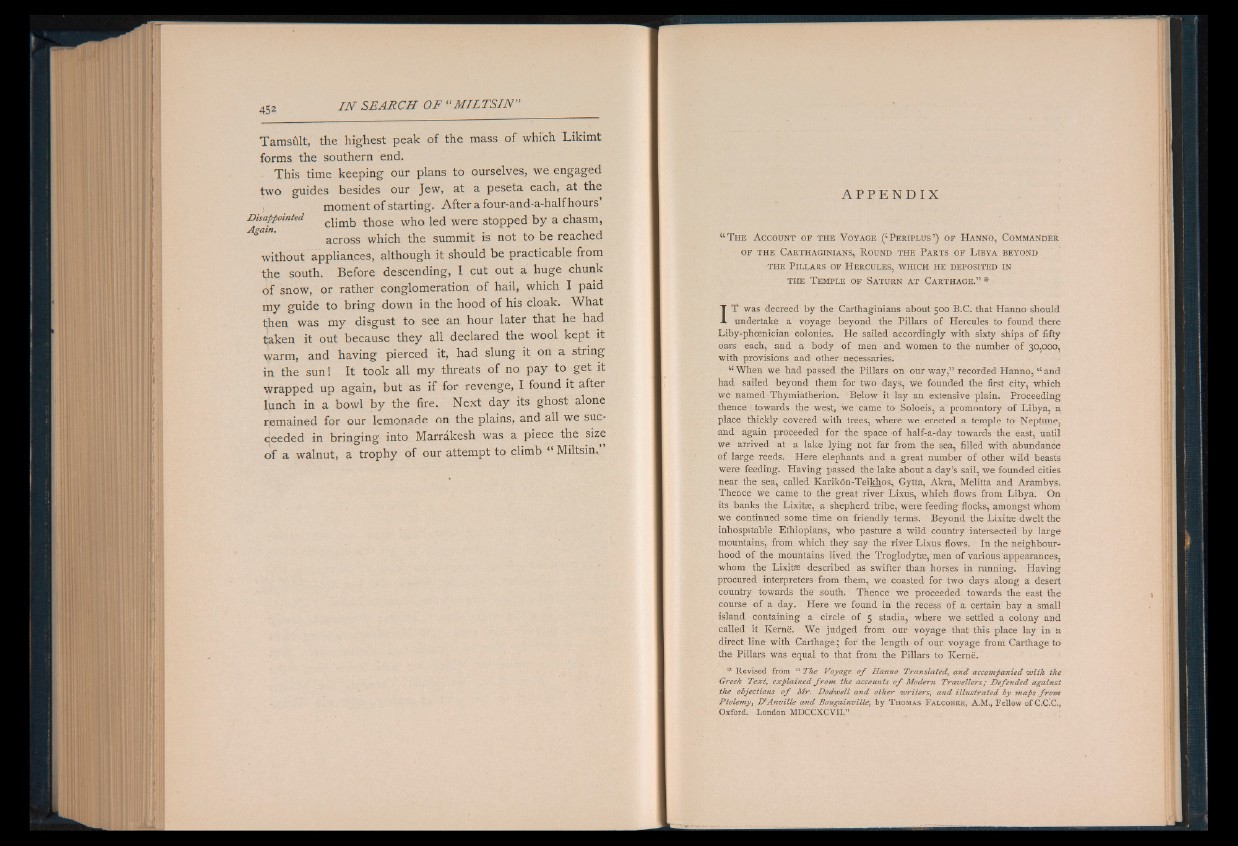
Tamsult, the highest peak of the mass of which Likimt
forms the southern end.
This time keeping our plans to ourselves, we engaged
two guides besides our Jew, at a peseta each, at the
moment of starting. After a four-and-a-half hours’
Disappointed climb those who je(j were stopped by a chasm,
across which the summit is not to be reached
without appliances, although it should be practicable from
the south. Before descending, 1 cut out a huge chunk
o f snow, or rather conglomeration o f hail, which I paid
my guide to bring down in the hood of his cloak. What
then was my disgust to see an hour later that he had
taken it out because they all declared the wool kept it
■\yarm, and having pierced it, had slung it on a string
in the sunl It took all my threats of no pay to get it
wrapped up again, but as if for revenge, I found it after
ljinch in a bowl by the fire. Next day its ghost alone
remained for our lemonade on the plains, and all we succeeded
in bringing into Marrakesh was a piece the size
o f a walnut, a trophy of our attempt to climb “ Miltsin,
A P P E N D I X
“ T h e A c c o u n t o f t h e V o y a g e ( ‘ P e r ip l u s ’) o f H a n n o , C om m a n d e r
o f t h e C a r t h a g in ia n s , R o u n d t h e P a r t s o f L ib y a b e y o n d
t h e P il l a r s o f H e r c u l e s , w h ic h h e d e p o s it e d in
t h e T em p l e o f S a t u r n a t C a r t h a g e .” *
I T was decreed by the Carthaginians about 500 B.C. that Hanno should
undertake a voyage beyond the Pillars of Hercules to found there
Liby-phoenician colonies. He sailed accordingly with sixty ships of fifty
oars each, and a body of men and women to the number of 30.000,
with provisions and other necessaries.
“ When we had passed the Pillars on our way,” recorded Hanno, “ and
had sailed beyond them for two days, we founded the first city, which
we named Thymiatherion. : Below it lay an extensive plain. Proceeding
thence towards the west, we came to Soloeis, a promontory of Libya, a
place thickly covered with trees, where we erected a temple to Neptune,
and again proceeded for the space o f half-a-day towards the east, until
we arrived at a lake lying not far from the sea, filled with abundance
of large reeds. Here elephants and a great number of other wild beasts
were feeding. Having passed the lake about a day’s sail, we founded cities
near the sea, called Karikón-Teikhos, Gytta, Akra, Melitta and Arambys,
Thence we came to the great river Lixus, which flows from Libya. On
its banks the Lixitee, a shepherd tribe, were feeding flocks, amongst whom
we continued some time on friendly terms. Beyond the Lixitee dwelt the
inhospitable Ethiopians, who pasture a wild country intersected by large
mountains, from which they say the river Lixus flows. In the neighbour-
hood o f the mountains lived the Troglodytes, men of various'appearances,
whom the Lixitse described as swifter than horses in running. Having
procured interpreters from them, we coasted for two days along a desert
country towards the south. Thence we proceeded towards the east the
course of a day. * Here we found in the recess of a certain bay a small
island containing a circle of 5 stadia, where we settled a colony and
called it Kerne. We judged from our voyage that this place lay in a
direct line with Carthage ; for the length of our voyage from Carthage to
the Pillars was equal to that from the Pillars to Kerne.
551 Revised from 11 The Voyage o f Hanno T ran s la ted a n d accompanied with the
•Greek Text, explained fr om the accounts o f Modern Travellers ; Defended against
the objections o f Mr. Dodwell and other writerst and illustrated by maps fr om
Ptolemy, D'Anville and Bougainville, by T h o m a s F a l c o n e r , A.M., Fellow o f C.C.C.,
Oxford. London MDCCXCVII.”